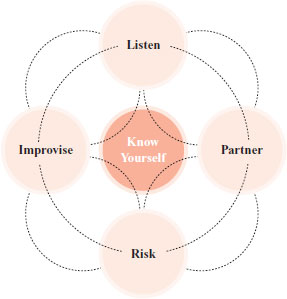Chapter 10
Know Yourself
Introspection, the act of looking within, helps you lead with trust. Knowing yourself makes it possible to adjust to people and situations, facilitates empathy by making it easier to relate to others and be related to, and paves the way for more rewarding working relationships. This chapter offers practical ways to increase your self-knowledge with guidance on how to look inward, turn blind spots into insights, and experiment regularly. We also suggest ways to use expanded self-awareness to increase your integrity and build trust.
The basis of Emotional Intelligence is self-awareness,1 and trustworthiness operates in much the same way. To know yourself (Figure 10.1) is to be cognizant of your weaknesses, triggers, and hot buttons, as well as your strengths, interests, and sources of passion and purpose. Knowing yourself is not about being narcissistic, self-obsessed, or perfect. It is about achieving a level of self-awareness that, paradoxically, lowers your self-orientation and improves your ability to connect with others. The more self-aware you are, the better you are able to manage yourself, and the less likely you are to act automatically from your blind spots.
Figure 10.1 Five Trust Skills: Know Yourself

How Blind Spots Impede Trust-Building
Without self-knowledge you run the risk of damaging trust without even realizing it.
Blind spots, or aspects ...

